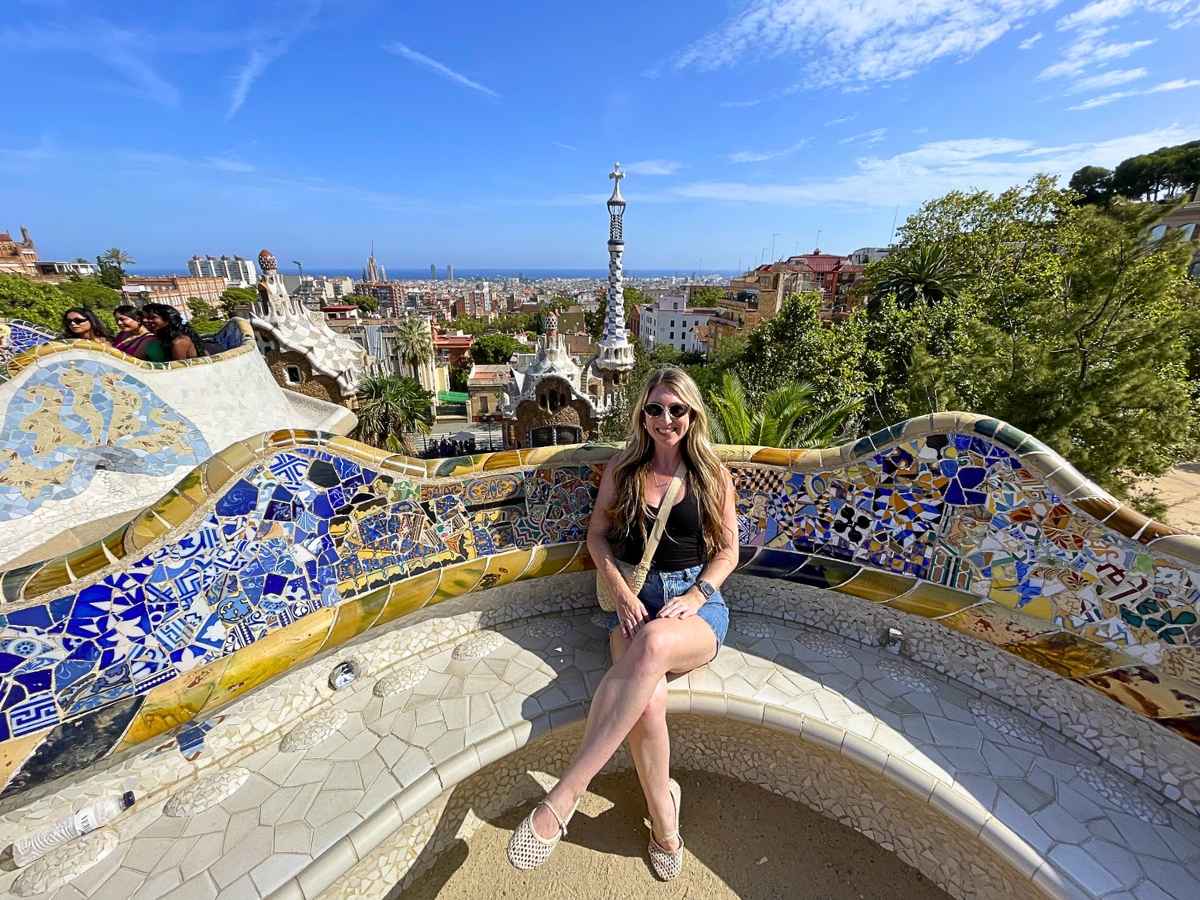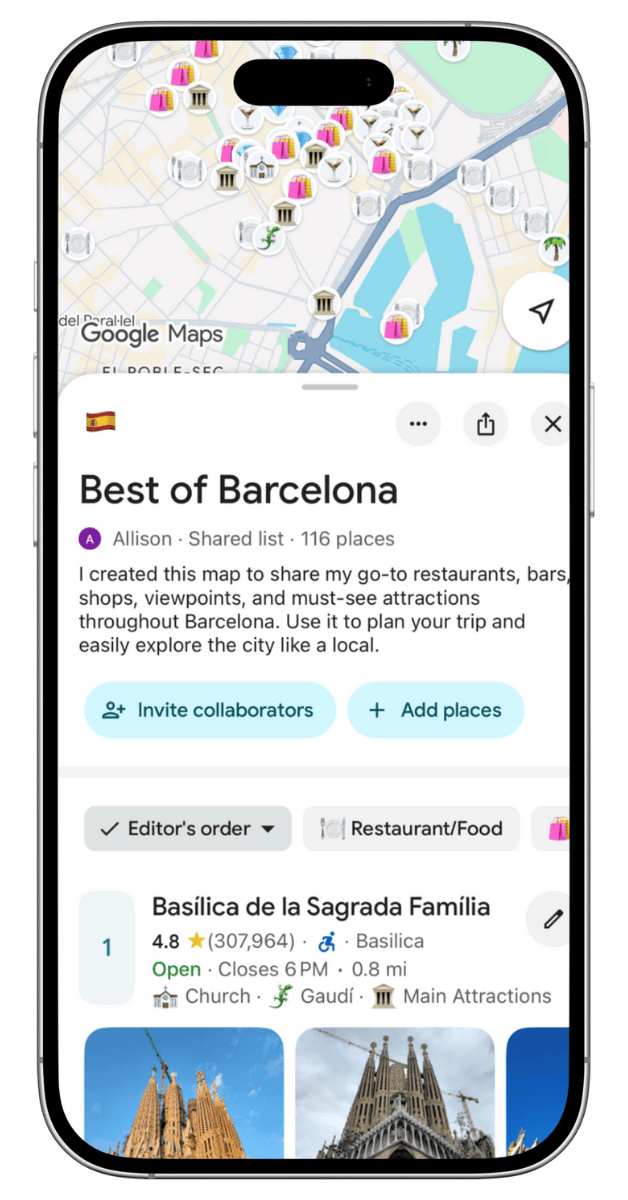How to Visit Park Güell: Tickets, Tips, & Best Time to Go


Planning a trip to Barcelona and wondering how to visit Park Güell? You’re in the right place!
As a travel blogger that lives in Barcelona, I’ve visited this iconic park many times and know how tricky it can be to plan your visit.
Since tickets must be booked in advance, many travelers miss out simply because they didn’t plan ahead.
In this guide, I’ll walk you through everything you need to know about visiting Park Güell, from how to get tickets to the best times to go and where to find the best photo spots.
I’ll also share practical tips on what to expect and how to get there. Keep reading to make the most of your visit to this famous park in Barcelona!
Brief History of Park Güell
Park Güell (pronounced “Park Gway”) was designed by the renowned architect Antoni Gaudí and built between 1900 and 1914 as part of an ambitious residential project.
Commissioned by Eusebi Güell, the plan was to create a luxury housing development inspired by nature and organic architecture.
However, due to a lack of buyers, the project was abandoned, and the land was later converted into a public park in 1926.
Today, Park Güell is one of Barcelona’s most famous landmarks and a UNESCO World Heritage Site, showcasing Gaudí’s signature colorful mosaics, curved structures, and innovative design.

Park Güell Tickets
Now, let’s review the ticket situation at Park Güell Barcelona.
Do You Need to Buy Park Güell Tickets in Advance?
Probably the biggest thing you need to know about visiting Park Güell is that tickets must be booked in advance.
The park has a timed entry system and limits the number of visitors per time slot, so if you show up without a ticket, there’s a good chance you won’t be able to get in.
To avoid disappointment, it’s best to purchase your tickets online ahead of time, especially during peak tourist seasons.
I’d recommend booking them at least 2-3 days in advance, but during the summer months or holidays, it’s best to book them even earlier.

Park Güell Ticket Prices & Types
There are 3 main types of tickets available at Park Güell:
Park Güell Visit
The general admission ticket costs €18 and grants access to the Monumental Zone, where you’ll find Gaudí’s most famous architectural features, as well as the park’s scenic green areas.
It’s the best option for those who prefer to explore at their own pace without a guided tour.
Park Güell Guided Tour
The guided tour ticket costs €35 and includes a Park Güell tour in Catalan, Spanish, English, or French, with a maximum of 25 people per group.
A knowledgeable guide will provide deeper insights into Gaudí’s design, the park’s history, and hidden details that you might otherwise miss.
Park Güell Visit with Gaudi House Museum
The combined ticket costs €24 and includes general admission to Park Güell along with access to the Gaudí House Museum, where the architect lived for nearly 20 years.
It’s a great choice for those who want to learn more about Gaudí’s life and see original furniture and objects designed by him.
Where to Buy Park Güell Tickets
The best place to buy Park Güell tickets is through the official Park Güell website, as it offers the lowest prices with no extra fees.
However, if tickets to Park Güell are sold out for your preferred time slot, you can also check GetYourGuide, which sometimes has availability even when the official site does not.

Park Güell Guided Tours
Guided tours of Park Güell are available if you are interested in upgrading your experience.
Are Guided Tours Worth It?
I think Park Güell is pretty easy to visit on your own but if you want to learn more about Gaudí’s vision, design techniques, and hidden details, a guided tour is a great way to enhance your visit.
Tours provide historical insights and skip-the-line access, making the experience smoother and more informative.
Many tours also combine Park Güell with Sagrada Familia, saving you time and effort, and the transportation hassle when visiting two of Barcelona’s top attractions.
Best Park Güell Tours to Book
Here are some of the best Park Güell guided tours to consider:
- Complete Gaudí Tour with Sagrada Familia, House Visit & Park Güell: A full Gaudí experience that includes Park Güell, Sagrada Familia, and a visit to one of Gaudí’s homes (Casa Batlló or Casa Vicens), perfect for architecture enthusiasts.
- Park Güell & Sagrada Familia Tour with Skip-the-Line Tickets: A small-group tour with expert commentary and priority access to both Park Güell and Sagrada Familia, making it ideal for those short on time.
- Best of Barcelona: Sagrada Familia & Park Güell with Pickup: A convenient guided tour that includes hotel pickup, perfect for visitors who want a hassle-free experience visiting Barcelona’s most famous landmarks.

Park Güell Location & Entrances
Park Güell is located on Carmel Hill in the Gràcia district, slightly outside Barcelona’s city center.
While it’s not too far from La Sagrada Familia, getting there requires some planning since the park sits on a steep hill.
Public transportation doesn’t always drop you off directly at the entrance, so expect a short uphill walk.
There are three main entrances to the park:
- Carrer d’Olot (Main Entrance): The most popular access point, located near the ticket office and main architectural features.
- Carretera del Carmel: Best for those arriving by taxi or private vehicle, as it’s close to the parking area.
- Avinguda del Santuari de Sant Josep de la Muntanya: A good option if taking the metro or bus, as it has an escalator to assist with the climb.

Plan your trip in minutes with my pre-pinned Google Map filled with the best attractions, restaurants, bars, shopping, and hidden gems in Barcelona.
- 100+ pre-pinned places so you don’t waste hours planning
- Filter by category to find food, sights, and local favorites
- Personal notes with insider tips for each spot
How to Get to Park Güell
Park Güell is located on a hill, so getting there requires a bit of planning. Depending on where you’re coming from, you can take the metro, bus, taxi, or even a hop-on-hop-off bus to reach the park.
Here are the best ways to get there:
Take a Bus
By public transportation, the best way to get to Park Güell is by taking the bus. I’d recommend just navigating to the park on Google Maps for the best route.
One of the most popular options is the V19 bus, and you’ll get off at the C N Cataluyna – Park Güell stop, which is right by the Carretera del Carmel entrance.
This option will get you closest to the entrance without having to walk uphill!
Other options are the H6 and D40 bus lines, which stop at Trav de Dalt – Torrent de les Flors. From there, it’s about a 10-minute walk to the park.

Take the Metro
Another option is to take the metro but there aren’t any metro stops that are super close to the park.
The green line (L3) Lesseps station is the closest recommended metro stop, but it’s still a 20-minute uphill walk to the park.
If you choose this route, it’s best to enter via Avinguda del Santuari de Sant Josep de la Muntanya, where an escalator can help with the climb.
I would avoid the Vallcarca station (the next stop on the green line), as the escalators are currently out of service.
Related Reading: How to Get Around in Barcelona
Take the Hop-on Hop-off Bus
Both the Barcelona Bus Turístic (blue line) and Barcelona City Tour (green line, East route) stop at Park Güell.
The bus stop is on Avinguda de la Mare de Déu de Montserrat, and from there, it’s a 10-minute walk to the entrance at Carretera del Carmel.

Take a Taxi or Uber
Taking a taxi or Uber is the easiest option if you want to avoid walking uphill.
There is a taxi stand on Carretera del Carmel, near the park entrance, which is most likely where the taxi will drop you off.
Walk to Park Güell
Technically it is possible to walk to Park Güell, but definitely be prepared for an uphill climb. It takes about 50 minutes from the city center.
Things to See at Park Güell
Here are the top sights you shouldn’t miss when visiting Park Güell:

The Greek Theater or Nature Square
This large open space is probably the most photographed part of the park and is surrounded by Gaudí’s famous serpentine bench, covered in colorful mosaic tiles.

Monumental Staircase
At the park’s main entrance, this grand staircase leads up to the Hypostyle Hall. It features the iconic El Drac (the dragon or salamander statue), one of Park Güell’s most photographed spots.

Hypostyle Hall
Originally intended as a marketplace for the residential project, this hall features 86 stone columns inspired by Greek temples. Make sure to look up as the ceiling is decorated with intricate mosaic medallions.

The Three Viaducts
Gaudí designed these elevated pathways—Pont de Baix (Lower Bridge), Pont del Mig (Middle Bridge), and Pont de Dalt (Upper Bridge)—to blend seamlessly with the natural landscape.

Austria Gardens
Originally a nursery, this peaceful green space now features a variety of plants and trees from Austria. It’s a quieter area of the park with a few Gaudí-inspired architectural elements and benches for relaxing.

The Porter’s Lodge Pavilions
These two gingerbread-looking buildings once housed the gatekeeper’s residence and a waiting area for visitors. Their brightly colored mosaic roofs and organic shapes make them a classic example of Gaudí’s unique style.

Washerwoman’s Portico
This curved stone corridor, shaped like a wave, was designed to support the road above it. The tilted columns and natural rock materials create a striking effect, making it one of the park’s most unique walkways.

The Three Crosses
Located at the highest point in Park Güell, this stone monument features three crosses and offers some of the best panoramic views of Barcelona. It’s a short but steep climb to the top, making it a rewarding spot for photos.

Gaudí House Museum
Once Gaudí’s residence, this museum showcases furniture, drawings, and personal objects from his life. Although it’s not included in the standard Park Güell ticket, it’s worth a visit for those interested in learning more about the architect’s work and daily life.

Forest Zone
A less-visited part of the park, this wooded area is free to visit and features winding trails and quiet viewpoints. It’s a great place to escape the crowds and experience Park Güell’s more natural side.
Park Güell Visitor Information
Here’s the basic visitor information to help you plan your visit:
Park Güell Opening Hours
Park Güell is typically open daily from 9:30am-7:00pm all year round, although the times do vary slightly depending on the season. The last entrance permitted is typically at 6:00pm.
Since tickets are assigned on the basis of time-slots, you can enter the park up to 30 minutes after your allocated start time.
Best Time to Visit Park Güell
The best time to visit Park Güell is early in the morning or late in the afternoon/early evening to avoid the biggest crowds.
Midday tends to be the busiest (and the hottest), especially during peak tourist seasons, making it harder to enjoy the park’s unique architecture and viewpoints.
If you want the best lighting for photos, early morning offers softer light, while late afternoon provides a warm glow over the city.
How Much Time to Spend at Park Güell
Most visitors spend about 1.5 to 2 hours exploring Park Güell, which is enough time to see the main architectural highlights and enjoy the views.
If you want to take photos, walk through the green areas, or visit the Gaudí House Museum, you may want to allow up to 3 hours.

Best Photo Spots at Park Güell
Park Güell is one of the most photogenic spots in Barcelona, but getting the perfect shot can be tricky with the crowds.
The serpentine bench at Nature Square offers stunning panoramic views of the city, while the Monumental Staircase with El Drac is one of the most popular photo spots.
Last time I visited, it was nearly impossible to get a picture alone with the famous mosaic lizard—unless you arrive early, you’ll have to just be patient as visitors take turns posing.
The Hypostyle Hall’s towering columns, the Three Viaducts, and the Three Crosses viewpoint also make for incredible backdrops.
To avoid large crowds in your photos, it’s best to visit first thing in the morning or late in the afternoon.

Tips for Visiting Park Güell
Follow these tips to make the most of your Park Güell experience:
- Book tickets in advance: Park Güell requires timed entry, and tickets must be purchased ahead of time. If you wait until the last minute, you might find your preferred time slot sold out.
- Get there early: The park gets crowded quickly, especially around popular photo spots like El Drac and the serpentine bench. Arriving right when it opens gives you the best chance to explore without large crowds.
- Wear comfortable shoes: The park is built on a hill with steep pathways and uneven terrain, so comfortable walking shoes are a must. If you plan to explore beyond the Monumental Zone, expect some uphill climbs.
- Bring sunscreen: The sun can be intense at Park Güell so make sure to wear sunscreen to avoid a sunburn, especially during the summer months.
- Bring water or snacks: There aren’t many places to buy food inside the park, and walking around in the sun can be tiring. Bringing a bottle of water and a light snack will help keep you refreshed.
- Check out the free Forest Zone: Many visitors don’t realize that the Forest Zone of Park Güell is free to enter. It’s a great place for a peaceful walk and offers hidden viewpoints with fewer crowds.
- Take the V19 bus to avoid walking uphill: The V19 bus stops close to the Carretera del Carmel entrance and saves you from a long uphill walk.
- Stop at Compà sandwich shop before or after: Located not too far away, Compà is one of the best sandwich shops in Barcelona and a great place to grab a delicious sandwich before or after your visit.

Visiting Park Güell: FAQs
Here are the answers to some of the most frequently asked questions about visiting Park Güell:
How do you pronounce Park Güell?
It’s pronounced “Park Gway” in Catalan, with a soft “G” sound similar to “way.”
Is Park Güell free?
Some areas, like the Forest Zone, are free, but access to the Monumental Zone requires a paid ticket.
Can you visit Park Güell without a ticket?
You can enter the Forest Zone for free, but the most famous parts of the park, including El Drac and the serpentine bench, require a paid ticket.
Is Park Güell worth visiting?
Yes! It’s one of Barcelona’s most unique landmarks, offering stunning architecture, panoramic views, and classic Gaudí designs.
Is there food available at Park Güell?
Food isn’t really sold within the park but there are some vendors selling bottles of water. There are also picnic areas available if you want to bring your own food.

Final Thoughts: Park Güell Visitor Guide
I hope this guide has helped you feel confident about planning your visit to Park Güell!
With its stunning architecture, colorful mosaics, and panoramic views, it’s truly one of Barcelona’s must-see landmarks.
Remember to book your tickets in advance on the official website, arrive early to avoid crowds, and wear comfortable shoes for exploring the park’s hilly terrain.
Whether you visit on your own or take a guided tour, Park Güell is an unforgettable experience that showcases Gaudí’s creativity and Barcelona’s unique charm.
READ NEXT:

